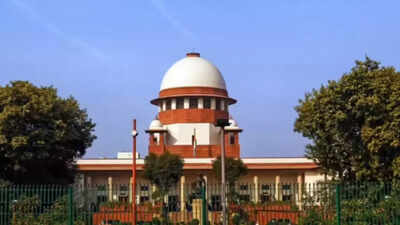NEW DELHI: The Supreme Court on Thursday held that Governors cannot indefinitely sit on Bills passed by state legislatures, stressing that India’s cooperative federalism demands dialogue with elected Houses rather than obstruction.At the same time, the Constitution Bench made it clear that constitutional courts cannot prescribe hard timelines for governors or the president to act on Bills, nor can they invent a doctrine of “deemed assent” or compel the president to seek the court’s opinion on such legislation.The five-judge Bench, led by chief justice B R Gavai and comprising justices Surya Kant, Vikram Nath, P S Narasimha and A S Chandurkar, delivered its opinion on a presidential reference that questioned whether courts could fix deadlines for constitutional authorities to grant or withhold assent to Bills under Articles 200 and 201 of the Constitution.
How the presidential reference reached the Supreme Court
In May, president Droupadi Murmu invoked Article 143(1) of the Constitution to seek the Supreme Court’s advisory opinion on a sensitive question: could constitutional courts, through judicial orders, impose timelines on the president when dealing with Bills forwarded by state Assemblies, and on governors when handling Bills under Article 200? Her decision followed an April 8 verdict in a case from Tamil Nadu, where a two-judge Bench had framed detailed guidelines on how quickly governors and the president must decide on Bills, and in an unprecedented move, used Article 142 to treat 10 Tamil Nadu Bills as having received “deemed assent” after prolonged inaction by the Governor. In a five-page reference, the president placed 14 questions before the court, seeking clarity on the nature and limits of the powers exercised by governors and the president under Articles 200 and 201, and whether judicial timelines or “deemed assent” were constitutionally permissible.
Key takeaways
1. Courts cannot impose fixed timelines on governors or the president.“The imposition of timelines is strictly contrary to the elasticity that Constitution has preserved…”2.Courts cannot substitute themselves for the Governor or President in granting assent to Bills.“The concept of Deemed assent in the context of Articles 200 and 201 presupposes that one Constitutional authority, namely court, could play a substitutional role for another Constitutional functionary authority – the governor or president.”3. Taking over the decision-making role of governors or the president violates the separation of powers. “Such usurpation of gubernatorial powers of governor or president is antithetical to the spirit of the constitution and the doctrine of separation of powers.”4. Granting deemed assent effectively removes the constitutional role of another authority, which is not permissible.“The concept of deemed assent of pending bills amounts to virtually takeaway of role of another Constitutional authority.”5. Courts cannot automatically intervene in every situation; intervention must be case-specific.“Not everything will lead courts to issue automatic directions to act and it has to be measured based on appropriate circumstances…”6. Courts can issue limited directions to ensure constitutional accountability, but only when justified. “…and this courts can issue limited directions in terms of constitutional accountability.”
Governors can’t sit on Bills indefinitely
Answering the reference, the Constitution Bench underlined that governors are not free to use silence as a veto. It held that in a system of cooperative federalism, a governor cannot indefinitely withhold assent to Bills duly passed by the state legislature.The court said that when doubts arise over a Bill, the Governor must adopt a process of institutional dialogue by sending the Bill back with comments or seeking clarifications rather than acting as an obstacle to the elected government. The message was that Raj Bhavans cannot become sites of “pocket veto” politics, where legislation is stalled simply by inaction.Reiterating the scheme of Articles 200 and 201, the Bench said a governor has the constitutional discretion either to:
- return a Bill with a message to the Assembly for reconsideration, or
- reserve the Bill for the president’s consideration.
“This discretion of the Governor cannot be whittled down,” the Bench led by CJI B R Gavai observed, even as it insisted that this discretion has to be exercised in a manner consistent with constitutional morality and the federal balance.
No judicial timelines — and no ‘deemed assent’
On the core issue raised by the president, the Supreme Court bluntly held that constitutional courts cannot prescribe mandatory timelines for the president or governors to take decisions on Bills. Any such fixed schedule, the Bench said, would amount to rewriting the Constitution, which consciously left these timelines open, subject to the overarching test of reasonableness and judicial review.It declared that the direction issued earlier by a two-judge Bench in the Tamil Nadu case, which had set out specific periods within which governors and the president must act on Bills, was unconstitutional. Judicial creativity, the court cautioned, cannot cross over into constitutional amendment. Going further, the Constitution Bench rejected the idea that courts can grant “deemed assent” to Bills pending before a governor. It held that using Article 142 to treat Bills as automatically assented to, merely because a governor delayed a decision, was outside the judiciary’s remit and violated the separation of powers.The five-judge Bench said the Supreme Court cannot unconstitutionally take over the powers of governors and the president in the name of doing justice. Articles 200 and 201, it emphasised, lay down a specific constitutional route for dealing with Bills, and courts cannot create a parallel mechanism that bypasses elected institutions and constitutional authorities.
Discretion preserved, but subject to constitutional discipline
While firmly shutting the door on judicially crafted timelines and deemed assent, the court also declined to strip governors or the president of their constitutional discretion.The Bench reiterated that a Governor’s options under Article 200 — assent, withholding assent, returning the Bill with a message, or reserving it for the president are part of the constitutional design and “cannot be whittled down”. However, this does not mean that a governor can weaponise discretion to frustrate an elected government’s legislative agenda.The judgment leaves space for constitutional courts to examine cases of egregious delay or mala fide conduct by governors or the president, and to issue directions for a decision to be taken, but it stops short of allowing the judiciary to write hard deadlines or to substitute its own decision for that of constitutional authorities. In other words, courts can prod, but they cannot step into the shoes of the Raj Bhavan or Rashtrapati Bhavan.
President cannot be told to seek SC’s opinion
The Constitution Bench also disagreed with a two-judge Bench’s earlier view that the president should seek the Supreme Court’s opinion on the constitutionality of a Bill reserved for her consideration by the governor.It held that while Article 143 empowers the president to refer questions of law or fact of public importance to the Supreme Court, the initiative to seek such an opinion rests solely with the president. The court cannot direct the president to make a reference, nor can it insist that every controversial or potentially unconstitutional Bill reserved under Article 201 be routed through an advisory opinion. By answering the presidential reference in this manner, the Supreme Court has attempted to walk a narrow line: reaffirming that governors are bound by the spirit of cooperative federalism and cannot paralyse state legislation through indefinite delay, while also warning that judges cannot re-write the constitutional script by fixing rigid timelines, inventing “deemed assent” or commandeering the advisory powers of the president. Go to Source




